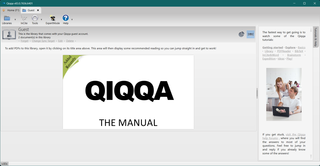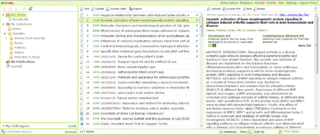Related Research Articles

LaTeX is a software system for document preparation. When writing, the writer uses plain text as opposed to the formatted text found in WYSIWYG word processors like Microsoft Word, LibreOffice Writer and Apple Pages. The writer uses markup tagging conventions to define the general structure of a document, to stylise text throughout a document, and to add citations and cross-references. A TeX distribution such as TeX Live or MiKTeX is used to produce an output file suitable for printing or digital distribution.

BibTeX is reference management software for formatting lists of references. The BibTeX tool is typically used together with the LaTeX document preparation system. Within the typesetting system, its name is styled as . The name is a portmanteau of the word bibliography and the name of the TeX typesetting software.
EndNote is a commercial reference management software package, used to manage bibliographies and references when writing essays, reports and articles. EndNote was written by Richard Niles, and ownership changed hands several times since it was launched in 1989 by Niles & Associates: in 2000 it was acquired by Institute for Scientific Information’s ResearchSoft Division, part of Thomson Corporation, and in 2016 by Clarivate.

Zotero is a free and open-source reference management software to manage bibliographic data and related research materials, such as PDF files. Features include web browser integration, online syncing, generation of in-text citations, footnotes, and bibliographies, an integrated PDF reader and note editor, as well as integration with the word processors Microsoft Word, LibreOffice Writer, and Google Docs. It was originally created at the Center for History and New Media at George Mason University and, as of 2021, is developed by the non-profit Corporation for Digital Scholarship.
ContextObjects in Spans (COinS) is a method to embed bibliographic metadata in the HTML code of web pages. This allows bibliographic software to publish machine-readable bibliographic items and client reference management software to retrieve bibliographic metadata. The metadata can also be sent to an OpenURL resolver. This allows, for instance, searching for a copy of a book at a specific library.
The following tables compare notable reference management software. The comparison includes older applications that may no longer be supported, as well as actively-maintained software.

BibDesk is an open-source reference management software package for macOS, used to manage bibliographies and references when writing essays and articles. It can also be used to organize and maintain a library of documents in PDF format and other formats. It is primarily a BibTeX front-end for use with LaTeX, but also offers external bibliographic database connectivity for importing, a variety of means for exporting, and capability for linking to local documents and automatically filing local documents. It takes advantage of many macOS features such as AppleScript and Spotlight.

NewGenLib is an integrated library management system developed by Verus Solutions Pvt Ltd. Domain expertise is provided by Kesavan Institute of Information and Knowledge Management in Hyderabad, India. NewGenLib version 1.0 was released in March 2005. On 9 January 2008, NewGenLib was declared free and open-source under GNU GPL. The latest version of NewGenLib is 3.1.1 released on 16 April 2015. Many libraries across the globe are using NewGenLib as their Primary integrated library management system as seen from the NewGenlib discussion forum.
CiteProc is the generic name for programs that produce formatted bibliographies and citations based on the metadata of the cited objects and the formatting instructions provided by Citation Style Language (CSL) styles. The first CiteProc implementation used XSLT 2.0, but implementations have been written for other programming languages, including JavaScript, Java, Haskell, PHP, Python, Ruby and Emacs Lisp.

Mendeley is a reference manager software founded in 2007 by PhD students Paul Foeckler, Victor Henning, Jan Reichelt and acquired by Elsevier in 2013. It is used to manage and share research papers and generate bibliographies for scholarly articles.

Qiqqa is a free and open-source software that allows researchers to work with thousands of PDFs. It combines PDF reference management tools, a citation manager, and a mind map brainstorming tool. It integrates with Microsoft Word XP, 2003, 2007 and 2010 and BibTeX/LaTeX to automatically produce citations and bibliographies in thousands of styles.

WizFolio was a web-based reference management software for researchers to manage, share their research and academic papers and generate citations in scholarly writings. It used plug-ins to collect bibliographic information, videos, and patents from webpages. WizFolio ceased to be available at the end of 2017.

Gitit is a form of wiki software employing a distributed revision control system such as Git to manage the wiki history, and the Pandoc document conversion system to manage markup – permitting, among other things, the inclusion of LaTeX mathematical markup.

Apache OpenOffice (AOO) is an open-source office productivity software suite. It is one of the successor projects of OpenOffice.org and the designated successor of IBM Lotus Symphony. It was a close cousin of LibreOffice, Collabora Online and NeoOffice in 2014. It contains a word processor (Writer), a spreadsheet (Calc), a presentation application (Impress), a drawing application (Draw), a formula editor (Math), and a database management application (Base).

Zim is a graphical text editor designed to maintain a collection of locally stored wiki-pages, a personal wiki. Each wiki-page can contain things like text with simple formatting, links to other pages, attachments, and images. Additional plugins, such as an equation editor and spell-checker, are also available. The wiki-pages are stored in a folder structure in plain text files with wiki formatting. Zim can be used with the Getting Things Done method.

BibBase is a free web-service for creating and maintaining publication pages. BibBase takes its input from a BibTex file or from DBLP, Zotero, BibSonomy, or Mendeley. It produces both HTML renderings, which can be embedded into an existing web page, as well as RSS feeds that allows others to subscribe to updates about new publications from the user.

The Journal Article Tag Suite (JATS) is an XML format used to describe scientific literature published online. It is a technical standard developed by the National Information Standards Organization (NISO) and approved by the American National Standards Institute with the code Z39.96-2012.
Pandoc is a free-software document converter, widely used as a writing tool and as a basis for publishing workflows. It was created by John MacFarlane, a philosophy professor at the University of California, Berkeley.

Paperpile is a web-based commercial reference management software, with special emphasis on integration with Google Docs and Google Scholar. Parts of Paperpile are implemented as a Google Chrome browser extension. It was founded in 2012, and is produced by Paperpile LLC.
Gollum is a wiki software using git as the back end storage mechanism, and written mostly in Ruby. It started life as the wiki system used by the GitHub web hosting system. Although the open source Gollum project and the software currently used to run GitHub wikis have diverged from one another, Gollum strives to maintain compatibility with the latter. Currently it is used by GitLab server to store and interconnect wiki-pages with wiki-links, but the plan is to move complete away from Gollum in the future.
References
- ↑ Pandoc. "Pandoc — About Pandoc". Pandoc. Retrieved 2021-01-06.
- ↑ CiteProc at OpenOffice Bibliographic Project. http://bibliographic.openoffice.org/citeproc/index.html
- ↑ OpenOffice Bibliographic Project. http://bibliographic.openoffice.org/
- ↑ Update instructions to convert CSL 0.8.1 styles to the 1.0 format. http://citationstyles.org/downloads/upgrade-notes.html#updating-csl-0-8-styles
- ↑ "citation-style-language/styles". December 30, 2020 – via GitHub.